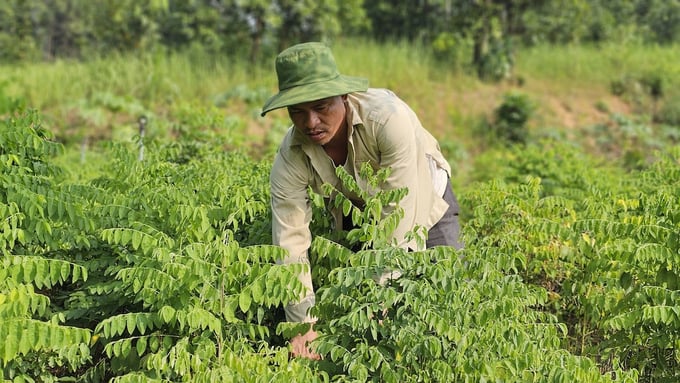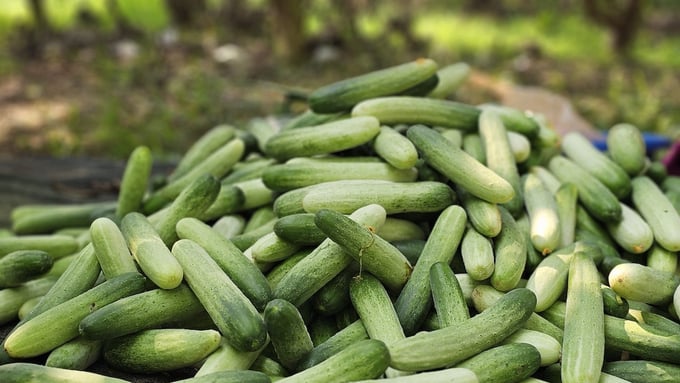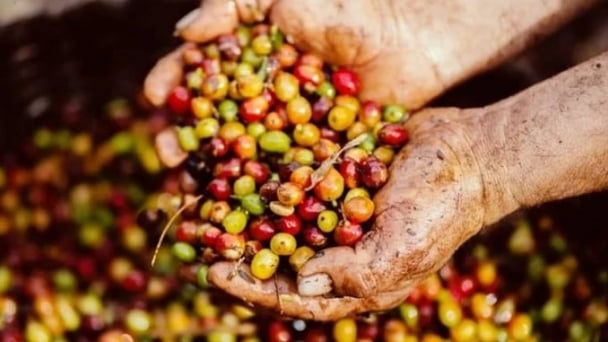June 17, 2025 | 20:59 GMT +7
June 17, 2025 | 20:59 GMT +7
Hotline: 0913.378.918
June 17, 2025 | 20:59 GMT +7
Hotline: 0913.378.918

Upland farmers are converting to organic agricultural production to enhance crop value. Photo: H.D.
The designated safe vegetable production areas in Gia Phu Commune include the hamlets of Giao Ngay, Giao Tien, Ben Pha, Chinh Tien, and Soi Co. Local households in these areas have actively converted to organic agricultural production and improved soil conditions to grow a variety of crops, including cucumbers, common beans, asparagus beans, cabbage, tomatoes, and various herbs.
Nguyen Van Tuat, a farmer in Chinh Tien Hamlet, rotates and intercrops various vegetables on over 2 hectares of land to sustain year-round production. After deducting expenses, his family earns nearly 300 million VND annually. At present, he is harvesting the final batch of cucumbers and preparing the soil for the next crop of kohlrabi and cabbage.
"After clearing the garden and collecting agricultural by-products, I will plow, aerate the soil, and apply microbial organic fertilizers with trichoderma as a base. This process helps eliminate harmful bacteria in the soil. Farmers in this area avoid using pesticides or herbicides. Instead, we want to focus on organic agricultural production to enhance productivity and product quality," Tuat remarked.
Local farmers previously relied on habits to cultivate crops without following a standardized technical procedure. Accordingly, they used different fertilizers, including chemical fertilizers, animal manure and compost, for each crop cycle without addressing soil sterilization or nutrient improvement.
Without adequate soil treatment, two consecutive cucumber crops typically led to severe pest issues and stunted fruit. After receiving guidance from agricultural extension officers on soil improvement, several households were able to grow three cucumber crops per year. Between each crop cycle, farmers add nutrients to the soil in preparation for the next season, with the goal of maintaining healthy plant growth and development.
Drawing on his extensive experience, Tuat noted that crops similar to cucumbers, gourds, and pumpkins require a balanced fertilization process. The use of chicken or pig manure is insufficient because these crops are harvested continuously. The soil requires at least five to six days to absorb nutrients from these fertilizers, subsequently leaving the crops nutrient-deficient in the meantime. To maintain quality, Tuat recommends mixing organic fertilizers to sustain soil nutrition over time.
Notably, a considerable number of large-scale farmers in Chinh Tien hamlet have invested in a comprehensive irrigation system, which includes a spraying and misting feature, to reduce labor requirements. Some households are also considering drilling wells to replace pond water for better crop health.
Nguyen Xuan Hung, a farmer in Soi Co Hamlet, cultivates over 4,000 square meters of vegetables. After flooding damaged his land, his family immediately restored the soil to plant bitter gourd in time for the next season. His crop is currently ready for harvest.
"Our soil is difficult to work with, and it often floods during the rainy season. However, we were able to cultivate by plowing and applying lime powder to dry out the soil. Annual soil improvement with organic and animal-based fertilizers reduces costs while increasing productivity and quality," Hung shared.

With soil improvement and nutrient supplementation, farmers were able to produce delicious and visually appealing late-season cucumbers. Photo: H.D.
Heavy rains and flooding affected large areas of Gia Phu Commune’s vegetable crops in the past, severely disrupting the livelihoods and production activities of local farmers. After the water receded, local authorities and technical agencies promptly provided on-site guidance to help farmers implement drainage measures and promptly restore the damaged vegetable areas.
Le Khanh Trong, Vice Chairman of the Gia Phu Commune People's Committee in Bao Thang District, Lao Cai Province, stated that under Resolution No. 10 on the commodity-oriented agricultural development strategy issued by the Lao Cai Provincial Party Committee, the commune has enhanced its efforts to promote crop restructuring. Accordingly, Gia Phu focuses on cultivating vegetables, fruits, and tubers that are high-potential and advantageous for the local community. Additionally, the commune has encouraged its farmers to utilize high-yield, high-quality varieties, establish production and consumption linkages, and boost economic efficiency. These efforts aim to foster sustainable agricultural development and improve farmers' incomes. At present, the commune's total vegetable acreage has expanded considerably, with plans to to cover up to 50 hectares in the near future.
Local governments have instructed farmers to adopt scientific and technical measures, including biological pest control and organic-oriented soil enhancement, with the aim of promoting safe vegetable production. The commune has also proposed building a water-efficient irrigation system and providing support for installing galvanized steel mesh trellises on concrete frames to optimize land use efficiency.
Translated by Nguyen Hai Long
![Turning wind and rain into action: [7] Early disaster warnings help marine farmers minimize losses](https://t.ex-cdn.com/nongnghiepmoitruong.vn/608w/files/news/2025/06/17/z6704423696987_15fd32ffc26d590d204d520c9dac6786-nongnghiep-142942.jpg)
(VAN) In recent years, thanks to early disaster warnings and forecasting, marine farmers in Khanh Hoa province have been able to reduce risks and losses, thereby improving production efficiency.
![Turning wind and rain into action: [5] Hue applies modern technology in disaster forecasting](https://t.ex-cdn.com/nongnghiepmoitruong.vn/608w/files/news/2025/06/17/z6704423696987_15fd32ffc26d590d204d520c9dac6786-nongnghiep-093938.jpg)
(VAN) In Hue city, modern technology has recently been applied in meteorological and hydrological forecasting and warning, helping to reduce the damage caused by natural disasters.

(VAN) A cutting-edge farming technique being implemented on an experimental ranch in Arizona's Sonoran Desert has already saved a billion gallons of water over five years, according to Civil Eats.

(VAN) Poultry and pig production and the environment can be boosted through enhanced water technology, according to new research.

(VAN) Coffee prices on June 16, 2025 are unchanged. In Vietnam, local trading prices are holding steady, ranging around VND 112,000 – VND 112,500/kg.
![Turning wind and rain into action: [4] Bringing climate bulletins to remote and isolated areas](https://t.ex-cdn.com/nongnghiepmoitruong.vn/608w/files/linhnhp/2025/06/14/1152-z6704423696987_15fd32ffc26d590d204d520c9dac6786-nongnghiep-151141.jpg)
(VAN) The Vietnam Agriculture and Nature Newspaper interviewed Mr. Vu Thai Truong, Acting Head of Climate Change and Environment at UNDP Vietnam, to gain deeper insight into how climate bulletins are delivered to farmers.

(VAN) In Tien Giang, a high-tech shrimp farm has developed a distinctive energy-saving farming model that has yielded promising results.